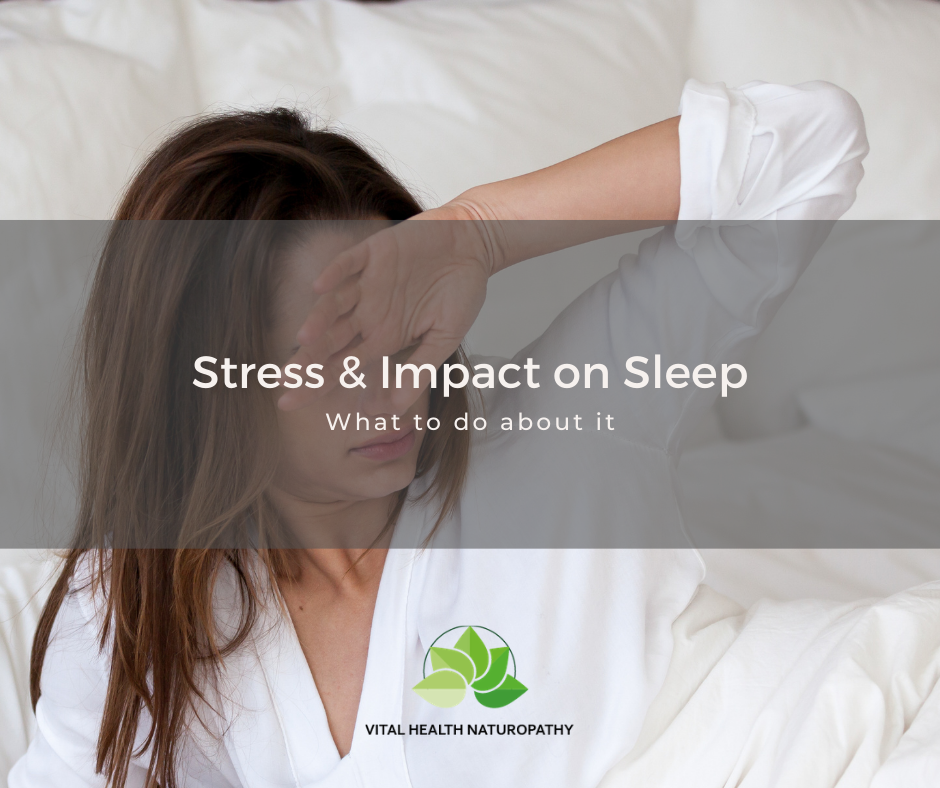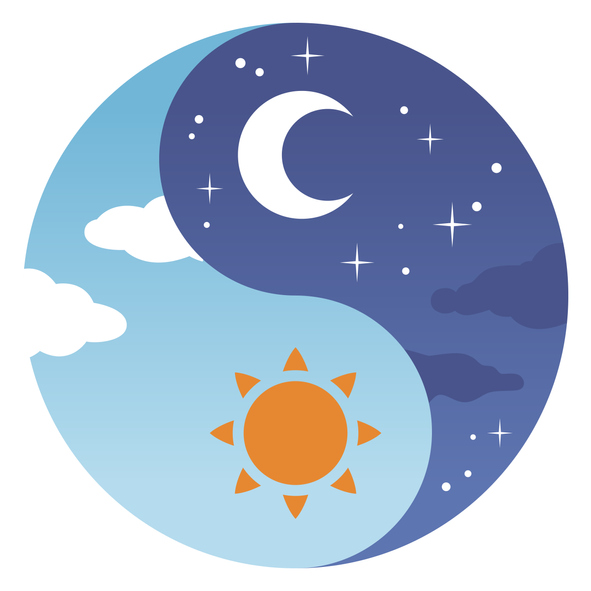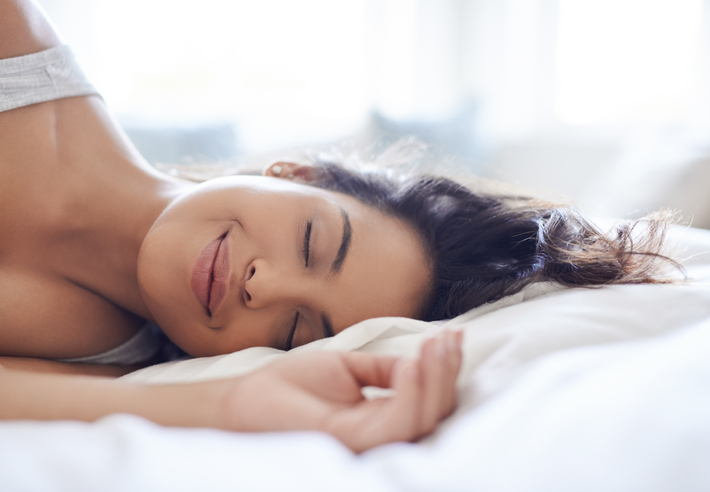
Most people who have trouble sleeping can often associate a stressful day or event, with difficulty in switching off an active mind come bedtime. The result is that you’re often battling with a mind that simply won’t turn off to fall asleep, or wakes you multiple times throughout the night.
If staring at the ceiling wishing desperately you were asleep sounds familiar, you know firsthand the negative impact stress can have on sleep. So, what’s happening on a biological level to cause this situation and what stress-reducing options are available to help improve sleep?
First, let’s take a look at how your sleeping pattern normally works when not adversely affected by stress.

Circadian Rhythm
The circadian rhythm is the body’s in-built body clock, that regulates the physiological process of the body sleep/wake cycle and repeats in a 24hr window.
When in balance, your body produces two primary hormones that govern this rhythm that responds to the cycles of the day (light) and night (dark).
- Cortisol is a stimulating hormone, which your body starts producing as the sun rises and the light prompts you to wake up and start your day. Peak levels of cortisol should occur in the morning, and then slowly start to drop off as the day heads into the evening, preparing the body to slow down and sleep.
- Melatonin: this sleep-promoting hormone starts to be produced in response to the sun setting and darkness falling. Levels of melatonin should be highest at night, helping you sleep, and should drop off as cortisol starts to rise again come morning. If cortisol levels remain elevated as darkness falls it will override the production of melatonin.

Disrupted Circadian Rhythm
However, for many people, due to various reasons, this rhythm becomes disrupted. This can look like:
- Raised cortisol peaking later in the day when they should be decreasing in preparation for sleep hormone (melatonin). This often leaves you feeling tired in the morning, but wired and alert in the evening; and
- Melatonin levels peaking lower or later, leading to poorer sleep quality & quantity, adding to that feeling of sluggishness in the morning.
What is one of the biggest triggers causing this imbalance? … You guessed it, STRESS !!!!……………
High-Stress = No Sleep
Stress evokes the fight or flight response (activation of the sympathetic nervous system).
This system produces the stress hormone adrenaline further increasing cortisol production. Together, they stimulate the body, keeping it on high alert, primed and ready to fight or flee from the perceived stressor.
While useful when actually necessary, these high levels of stress hormones continuously produced throughout the day can impair your circadian rhythm from cycling properly, resulting in melatonin production being affected come night time. This is then a recipe for your body clock to become disrupted and poor sleep to ensue.

High levels of stress hormones produced throughout the day can impair your circadian rhythm from cycling properly, resulting in melatonin production being affected come night time.
Goodbye Stress, Hello Sleep
If you feel your stress levels could be interrupting your circadian rhythm, leaving you unable to sleep properly, here are some suggestions to support sound slumber:
Herbalists and Naturopaths often prescribe herbal remedies to help balance the nervous system and downregulate an overactive nervous system. Always seek professional advice before taking herbs.
- Withania. If a stressful day or event leaves you feeling on edge or anxious, Withania is a potent herb commonly used to reduce anxiety. Whilst it works on your brain to do this, it also dials down your stress hormones, helping both your mind and body to calm down to fall asleep more easily.
- Magnesium. A must-have when stressed and is a mineral that is greatly depleted during times of stress. Increasing a bioavailable magnesium form will help to reduce stress, sleep and circadian rhythm. Increasing food sources rich in magnesium include green leafy vegetables, nuts, seeds and whole grains.
- Lavender. A herbal medicine well known for its calming influence at bedtime, lavender offers wonderful anxiolytic and sedating effects. If you struggle to fall asleep, take some lavender 30 to 60 minutes before bed, or if you struggle to stay asleep, take it as you go to bed.
- Passionflower. This herb works fantastically to increase the activity of your body’s main mood-soothing neurotransmitter Gamma-aminobutyric acid (GABA), helping you to feel calm and collected as you wind down after a long day.
- Mindfulness meditation. I’d suggest doing meditation 30 to 60 minutes before wanting to go to bed, to support your cortisol and adrenaline dropping, and your melatonin levels rising.
- Journaling. Having your mind know everything it was worried about is down on paper, or you’ve already created the to-do list for tomorrow allows it to wind down and fall asleep much easier.
Is it Sleep Time on the Circadian Clock?
Our circadian rhythms were designed to have us starting the day awake and energised, and slowly start to feel sleepy and ready for bed come evening. It’s this cycle that allows us to live our days productively but also have a restorative sleep each night. Going through a stressful day or period can then begin to disrupt this natural cycle, where higher levels of cortisol and adrenaline during the day leads to the improper or diminished production of sleep-promoting melatonin at night.
As feeling stressed is certainly a part of life at times, it’s up to each of us find what soothing and stress-busting supplements and practices will reduce this stress and ensure we’re still getting a good night’s sleep. If you suspect your circadian rhythm has become out of balance due to longer-term stress, seek the support and guidance of a practitioner who can work with you to holistically address your stress and support your sleep. Creating a nourishing plan to address your stress can then mean looking forward to that peaceful, sound slumber.
References
Appel K, Rose T, Fiebich B, Kammler T, Hoffmann C, Weiss G. Modulation of the γ-aminobutyric acid (GABA) system by Passiflora incarnata L. Phytother Res. 2011 Jun;25(6):838-43. doi: 10.1002/ptr.3352.
Auddy B, Hazra J, Mitra A, Abedon B, Ghosal S. Standardized withania somnifera extract significantly reduces stress-related parameters in chronically stressed humans: a double-blind, randomized, placebo-controlled study. JANA. 2008; 11(1).
Gamble KL, Berry R, Frank SJ, Young ME. Circadian clock control of endocrine factors. Nat Rev Endocrinol. 2014 Aug;10(8):466-75. doi: 10.1038/nrendo.2014.78.
Kasper S, Anghelescu I, Dienel A. Efficacy of orally administered Silexan in patients with anxiety-related restlessness and disturbed sleep–A randomized, placebo-controlled trial. Eur Neuropsychopharmacol. 2015 Nov;25(11):1960-7. doi: 10.1016/j.euroneuro.2015.07.024.
Salve J, Pate S, Debnath K, Langade D. Adaptogenic and anxiolytic effects of ashwagandha root extract in healthy adults: a double-blind, randomized, placebo-controlled clinical study. Cureus. 2019;11(12):e6466. doi: 10.7759/cureus.6466.
Original article by Claire Murray, Metagenics. Updated by Vital Health